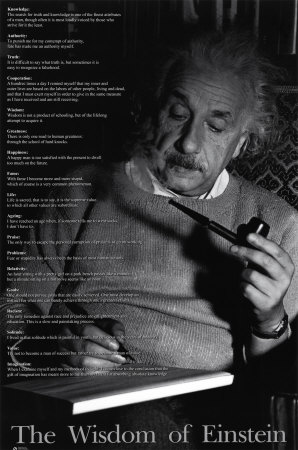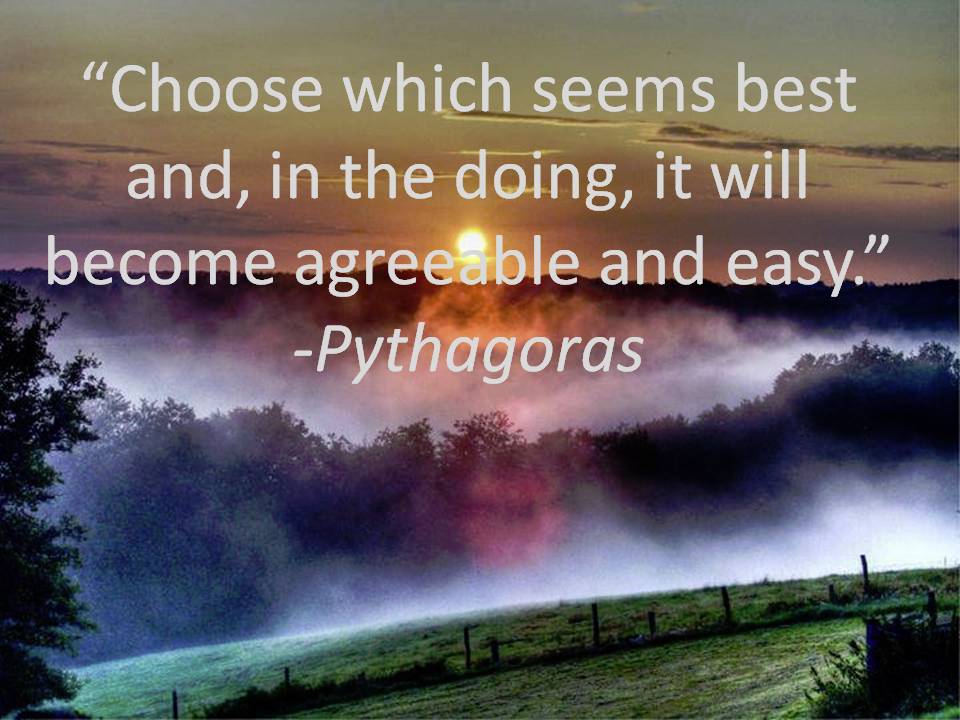|
home | what's new | other sites | contact | about |
|||||||
|
Word Gems exploring self-realization, sacred personhood, and full humanity
Wisdom
"But who, alas! can love, and then be wise?" Lord Byron
Meditations by Marcus Aurelius: book summary, key lessons, and best quotes
Knowledge: The search for truth and knowledge is one of the finest attributes of a man, though often it is most loudly voiced by those who strive for it the least. Authority: To punish me for contempt of authority, fate has made me an authority myself. Truth: It is difficult to say what truth is, but sometimes it is easy to recognize a falsehood. Cooperation: A hundred times a day I remind myself that my inner and outer lives are based on the labors of other people, living and dead, and that I must exert myself in order to give in the same measure as I have received and am still receiving. Wisdom: Wisdom is not a product of schooling, but of the life-long attempt to acquire it. Greatness: There is only one road to human greatness: through the school of hard knocks. Happiness: A happy man is too satisfied with the present to dwell too much on the future. Fame: With fame I become more and more stupid, which of course is a very common phenomenon. Life: Life is sacred, that is to say, it is the supreme value, to which all other values are subordinate. Ageing: I have reached an age when, if someone tells me to wear socks, I don't have to. Praise: The only way escape the personal corruption of praise is to go on working. Problems: Fear or stupidity has always been the basis of most human actions. Relativity: An hour sitting with a pretty girl on a park bench passes like a minute, but a minute sitting on a hot stove seems like an hour. Goals: One should not pursue goals that are easily achieved. One must develop an instinct for what one can barely achieve through one's greatest efforts. Racism: The only remedies against race and prejudice are enlightenment and education. This is a slow and painstaking process. Solitude: I lived in that solitude which is painful in youth, but delicious in the years of maturity. Value: Try not to become a man of success but rather try to become a man of value. Imagination: When I examine myself and my methods of thought, I come close to the conclusion that the gift of imagination has meant more to me than my talent for absorbing absolute knowledge. Frederic W. H. Myers, in the afterlife, transmitted to Juliet S. Goodenow: "You should cultivate your impressions, your intuitions - trust them as your guide where you travel and discover by sense. This faculty is easy of cultivation, when the student applies himself to the task. The cultivation of the spiritual will be slow as learning a foreign language; the material must be held in abeyance, or the dross of matter will obscure the transcendent realities awaiting discovery... Nations that overdevelop materialistic ideas lose the necessary spiritual balance to retain sufficient equilibrium. I deviate somewhat from my subject, to prove the essential things we should endeavor to obtain - knowledge throws upon experience a searchlight. We have learned that within is the universal way leading to this Wisdom... [Man] is himself the sovereign of his destiny, the master of his fate. Created in the Image of God, he is the Son of the Most High. Lighted by the lamp of conscience, he builds an empire within himself; his lordly possessions reach within to Infinitude... Why has man proceeded so far on his way without recognition of his destiny, his inheritance with the eternal nature of things? His vista of mind has encircled the globe; he reaches out and girdles the earth with the strength of his thought... You have the ability to think the thoughts of God, after Him, in conformance to this law - your mind is therefore the mind of a god, analytical - powerful."
Author Unknown: “I know what goes through the mind of a good man, what must go through the mind of a scoundrel.” Editor’s note: I still recall, during my first days at university a long time ago, discovering this quotation, and the impact it had on me; the source escapes me now. However, I noted a similar saying in Durants’ Lessons Of History: Joseph de Maistre: “I do not know what the heart of a rascal may be; I know what is in the heart of an honest man; it is horrible.” F. Scott Fitzgerald: "The test of a first-rate intelligence is the ability to hold two opposed ideas in mind at the same time and still retain the ability to function."
Kahlil Gibran: "The teacher who is indeed wise does not bid you to enter the house of his wisdom but rather leads you to the threshold of your mind." Francis Bacon: "A prudent question is one-half of wisdom." Naguib Mahfou: "You can tell whether a man is clever by his answers. You can tell whether a man is wise by his questions." Abraham Lincoln: "I do not think much of a man who is not wiser today than he was yesterday." Confucius: "By three methods we may learn wisdom: First, by reflection, which is noblest; Second, by imitation, which is easiest; and third by experience, which is the bitterest." Plato: "Wise men talk because they have something to say; fools, because they have to say something." George Santayana: "The hunger for facile wisdom is the root of all false philosophy." Euripides: "Cleverness is not wisdom." Georg C. Lichtenberg: "One's first step in wisdom is to question everything - and one's last is to come to terms with everything." Robert Louis Stevenson: "Most of our pocket wisdom is conceived for the use of mediocre people, to discourage them from ambitious attempts, and generally console them in their mediocrity." Henry David Thoreau: "A man is wise with the wisdom of his time only, and ignorant with its ignorance." William Saroyan: "Good people are good because they've come to wisdom through failure. We get very little wisdom from success, you know." Friedrich Nietzsche: "Does wisdom perhaps appear on the earth as a raven which is inspired by the smell of carrion?" Pierre Abelard: "The beginning of wisdom is found in doubting; by doubting we come to the question, and by seeking we may come upon the truth." Thomas Jefferson: "I hope our wisdom will grow with our power, and teach us, that the less we use our power the greater it will be." Lin Yutang: "Besides the noble art of getting things done, there is the noble art of leaving things undone. The wisdom of life consists in the elimination of non-essentials." Doc Childre and Deborah Rozma: "It is no longer enough to be smart - all the technological tools in the world add meaning and value only if they enhance our core values, the deepest part of our heart. Acquiring knowledge is no guarantee of practical, useful application. Wisdom implies a mature integration of appropriate knowledge, a seasoned ability to filter the inessential from the essential." Kahlil Gibran: "Wisdom stands at the turn in the road and calls upon us publicly, but we consider it false and despise its adherents." Joan Rivers: "Don't follow any advice, no matter how good, until you feel as deeply in your spirit as you think in your mind that the counsel is wise." The Upanishads: "The little space within the heart is as great as the vast universe. The heavens and the earth are there, and the sun and the moon and the stars. Fire and lightening and winds are there, and all that now is and all that is not." Stephen R. Covey, The 8th Habit: "Between stimulus and response there is a space. In that space lies our freedom and power to choose our response. In those choices lie our growth and our happiness... failing to notice that we have this space kills our ability to change." Diogenes: Wise kings generally have wise counselors; and he must be a wise man himself who is capable of distinguishing one. George Burns: Too bad that all the people who really know how to run the country are busy driving taxi cabs and cutting hair. Charles Dickens: There is a wisdom of the head, and a wisdom of the heart. Immanuel Kant: Science is organized knowledge. Wisdom is organized life. Cicero: The function of wisdom is to discriminate between good and evil. Lucius Annaeus Seneca: No man was ever wise by chance. Cicero: Nobody can give you wiser advice than yourself. Stephen Vincent Benet: We thought, because we had power, we had wisdom. H. L. Mencken: The older I grow the more I distrust the familiar doctrine that age brings wisdom. Elbert Hubbard: Every man is a damn fool for at least five minutes every day; wisdom consists in not exceeding the limit. George Santayana: Almost every wise saying has an opposite one, no less wise, to balance it. Juvenal: Never does nature say one thing and wisdom another. Mark Twain: The perfection of wisdom, and the end of true philosophy is to proportion our wants to our possessions, our ambitions to our capacities, we will then be a happy and a virtuous people. Epictetus: It is the nature of the wise to resist pleasures, but the foolish to be a slave to them. Robert Heinlein: But goodness alone is never enough. A hard cold wisdom is required, too, for goodness to accomplish good. Goodness without wisdom invariably accomplishes evil. Bo Lozoff: The great teachings unanimously emphasize that all the peace, wisdom, and joy in the universe are already within us; we don't have to gain, develop, or attain them. We're like a child standing in a beautiful park with his eyes shut tight. We don't need to imagine trees, flowers, deer, birds, and sky; we merely need to open our eyes and realize what is already here, who we really are - as soon as we quit pretending we're small or unholy. Publilius Syrus: From the errors of others, a wise man corrects his own. Mary Wilson Little: He who devotes sixteen hours a day to hard study may become at sixty as wise as he thought himself at twenty. Eric Hoffer: Wise living consists perhaps less in acquiring good habits than in acquiring as few habits as possible. Thomas H. Huxley: Perhaps the most valuable result of all education is the ability to make yourself do the thing you have to do, when it ought to be done, whether you like it or not; it is the first lesson that ought to be learned; and however early a man's training begins, it is probably the last lesson that he learns thoroughly. Margery Cuyler: I think wholeness comes from living your life consciously during the day and then exploring your inner life or unconscious at night. Lord Chesterfield, to his son: Never seem wiser, nor more learned, than the people you are with. Wear your learning, like your watch, in a private pocket, and do not pull it out and strike it merely to show you have one. If you are asked what o'clock it is, tell it, but do not proclaim it hourly and unasked, like the watchman. Sherman Finesilver, Chief Judge, US District Court: Do not confuse notoriety and fame with greatness... For you see, greatness is a measure of one's spirit, not a result of one's rank in human affairs. Rilke: Be patient with all that is unresolved in your heart. And try to love the questions themselves. Do not seek for the answers that cannot be given, for you wouldn't be able to live with them. And the point is to live everything, live the questions now, and perhaps without knowing it, you will live along, some day, into the answers. George W. Childs: Do not keep the alabaster box of your friendship sealed up until your friends are dead. Fill their lives with sweetness. Speak approving, cheering words while their ears can hear them, and while their hearts can be thrilled and made happier. The kind of things you mean to say when they are gone, say before they go. Andrew DaPassano: And when you have achieved serenity, you will benefit others by your presence. When your inner noise is silenced, you will have a quick, clear perspective on all human situations; you will be able to reach out effectively in generosity and compassion. Barbara De Angelis: If you aren't good at loving yourself, you will have a difficult time loving anyone, since you'll resent the time and energy you give another person that you aren't even giving to yourself. Kicking Bird, Dances With Wolves: Of all the trails in this life, there is one that matters most: it is the trail of a true human being. JFK, from the movie, Thirteen Days: There is something immoral about denying your own judgment. Native American prayer: Let me walk in beauty and make my eyes ever behold the red and purple sunset. Make my hands respect the things you have made, and my ears sharp to hear your voice. Make me wise so that I may understand the things you have taught my people. Let me learn the lessons you have hidden in every leaf and rock. I seek strength not to be greater than my brother but to fight my greatest enemy: myself. Make me always ready to come to you with clean hands and straight eyes. So when life fades as a fading sunset my spirit may come to you without shame. Australian Aboriginal proverb: We are all visitors to this time, this place. We are just passing through. Our purpose here is to observe, to learn, to grow, to love... and then we return home. Lord Chesterfield: Mankind is made up of inconsistencies, and no man acts invariably up to his predominant character. The wisest man sometimes acts weakly, and the weakest sometimes wisely. Henri Nouwen: Your body needs to be held and to hold, to be touched and to touch. None of these needs is to be despised, denied, or repressed. But you have to keep searching for your body's deeper need, the need for genuine love. Every time you are able to go beyond the body's superficial desires for love, you are bringing your body home and moving toward integration and unity. Reinhold Niebuhr: Nothing worth doing is completed in our lifetime. Dr. Lonny Brown: "Keep your heart open; even if it hurts, it's better than cynicism... I think 'higher levels' are those moments when we're not coming from the small ego, but there's no simple formula for honorable behavior. Only your soul knows [the what and the when regarding the realization of heart's desires]... karma has a way of manifesting what we need, not what we want. Man proposes and God disposes. Meanwhile your good intentions serve you well. Pray for guidance and peace." (8-24-02; 3-27-04) Jonathan Swift: The latter part of a wise man's life is taken up with curing the follies, prejudices, and false opinions he had contracted in the former. William Wordsworth: The human mind is capable of excitement without the application of gross and violent stimulants; and he must have a very faint perception of its beauty and dignity who does not know this. Richard Nixon, his farewell words: Always remember: others may hate you, but those who hate you don't win unless you hate them. And then you destroy yourself. Epictetus: Tentative efforts lead to tentative outcomes. Therefore, give yourself fully to your endeavors. Decide to construct your character through excellent actions and determine to pay the price of a worthy goal. The trials you encounter will introduce you to your strengths. Remain steadfast... and one day you will build something that endures, something worthy of your potential. Henry Wadsworth Longfellow: Look not mournfully to the past ... it comes not again; wisely improve the present - it is thine; go forth to meet the shadowy future without fear; and with a manly heart. Will & Ariel Durant, The Lessons of History: [Speaking of history's incessant rise-and-fall of nations] The only real revolution is in the enlightenment of the mind and the improvement of character, the only real emancipation is individual, and the only real revolutionists are philosophers and saints. Masanobu Fukuoka: Life on a small farm might seem primitive, but by living such a life we become able to discover the Great Path. I believe that one who deeply respects his neighborhood and everyday world in which he lives will be shown the greatest of all worlds. Howard Whitman, Success Is Within You: Success has the intrinsic character of a batting average... a successful life will have its days or even years of failure. It will certainly have its moments of utter washout. These are not blights upon such a life but merely the inevitable failings which bear testimony to the fact that success isn't easy. Frederic W. H. Myers, Vanishing Night, transmitted to Juliet S. Goodenow, 1923: It is not so much what you will find when you come to this side of life as what you will bring with you... Sleep is the best definition of death I know anything about -- just going to sleep unafraid to awake in a new and beautiful room, and to be satisfied. This is all there is... [On Earth] you are the apprentice to your own soul. Here you are the promoted individual... Bring all of your soul treasures - you will need them, your culture, your love of art, of music - all this you will use... Every want shall be satisfied. Material possessions you will not need... We are undisguised, for on our foreheads is the insignia of whatever we have gained in culture, love for humanity, charity, selflessness, energy and force, ambitions for the sake of others - all this is here waiting for us when we are given ... our Price, our Wage, whatever we have earned during our years of apprenticeship. Kama Sutra: If men and women act according to each other's liking, their love for each other will not be lessened, even in one hundred years. Abd ER-Rahman III of Spain (960): I have now reigned about 50 years in victory or peace, beloved by my subjects, dreaded by my enemies, and respected by my allies. Riches and honors, power and pleasure, have waited on my call, nor does any earthly blessing appear to have been wanting to my felicity. In this situation, I have diligently numbered the days of pure and genuine happiness which have fallen to my lot. They amount to fourteen. St. Paul, Galatians 6.4-5, The Message: Make a careful exploration of who you are and the work you have been given, and then sink yourself into that. Don't be impressed with yourself. Don't compare yourself with others.Each of you must take responsibility for doing the creative best you can with your own life. It is not by accident that the happiest people are those who make a conscious effort to live useful lives. Their happiness, of course, is not a shallow exhilaration where life is one continuous intoxicating party. Rather, their happiness is a deep sense of inner peace that comes when they believe their lives have meaning and that they are making a difference for good in the world. Ernest Fitzgerald Mohandas Gandhi: Whatever you do will be insignificant, but it is very important that you do it. Abigail Adams, 1775: I am more and more convinced that Man is a dangerous creature, and that power whether vested in many or a few is ever grasping, and like the grave cries give, give. The great fish swallow up the small, and he who is most strenuous for the Rights of the people, when vested with power, is as eager after the prerogatives of Government. You tell me of degrees of perfection to which Humane Nature is capable of arriving, and I believe it, but at the same time lament that our admiration should arise from the scarcity of the instances. Theodore Roosevelt, 1917: The things that will destroy America are prosperity at any price, peace at any price, safety first instead of duty first, and love of soft living and the get-rich-quick theory of life. Alvin Toffler, Rethinking the Future: The illiterate of the 21st century will not be those who cannot read and write but those who cannot learn, unlearn, and relearn. Elizabeth Fry, testimony from the Other Side: Fry speaking via Leslie Flint, direct-voice medium: "Here no one glories in being a leader – whereas in your world [in various organizations] you do get this sort of glorification of the individual [leader]; the first thing a person must learn here, if they are to progress, is to lose this idea of self-importance. Those who are really progressed on This Side never, never, give that impression - because it is not even in their nature to appear, or want to appear, important… I think that people will only recognize [who] Christ really was, when they begin to discount a lot of untoward creeds and dogmas, tacked on over the centuries by men who desired power and position – I would say to you, above all things, if you want to discover truth, avoid men of power and position, because … [they desire] power and position because of their material perception of things. Ellen Terry, testimony from the Other Side: Terry speaking via Leslie Flint, direct-voice medium: "I would say that this [life on our side] is the natural life and yours is the artificial, and that the truly natural life is the spiritual… the material life is only a pale reflection of the reality... Here there is no restriction placed upon expansion of expression; here you assimilate knowledge and experience; here you throw off more and more of the old self and become truly free... It is the narrow confines of earth which prevent individuals from becoming spiritual beings" Thomas Paine: War involves in its progress such a train of unforeseen circumstances that no human wisdom can calculate the end. Francis Bacon: Facts often appear incredible only because we are ill informed and cease to appear marvelous when our knowledge is extended. A library of wisdom is more precious than all wealth, and all things that are desirable cannot be compared to it. Richard de Bury Of all human pursuits, the pursuit of wisdom is the more perfect, the more sublime, the more useful, and the more agreeable. Thomas Aquinas
|
|||||||
|
|





